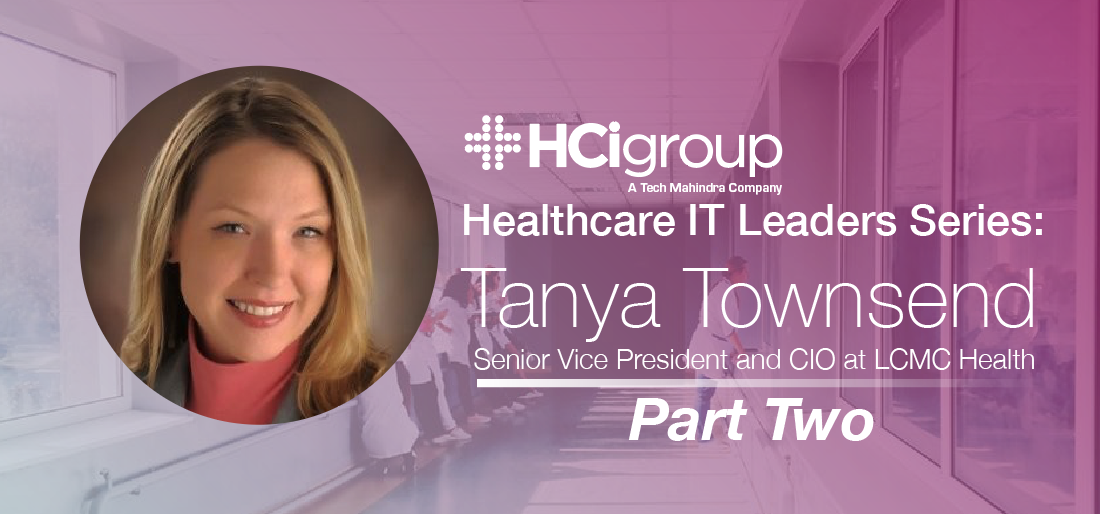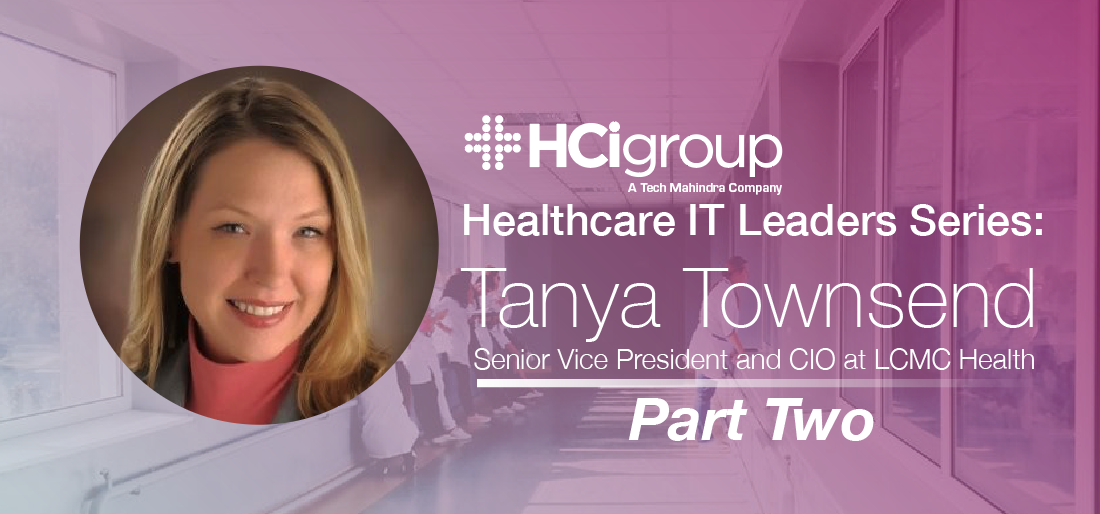Healthcare IT Leaders Series: Tanya Townsend (Part Two)


Tanya Townsend, Senior Vice President & CIO at LCMC Health, joins The HCI Group for an exclusive interview as part of our Healthcare IT Leaders Series. In part two of this two part interview, Tanya talks about LCMC's Epic implementation project, the people who have made an impact on her career and how she believes the CIO role has changed since she entered the industry.
Question: You mentioned your Epic implementation project, “Empire,” what have you seen as some of the most significant achievements from that project thus far?
So far, being on time and on budget is always a nice place to be! We are doing well with that. When you build up these plans, there is usually a three to five-year strategy. Despite the complexities of projects like these always seeming to grow, we have done a pretty good job managing the project since inception.
We now have four of five hospitals complete with one final to go in just a couple of months. I’ll share some highlights on the quality side of what we were trying to achieve. We wanted to integrate our care; it is amazing from the day we go live how our hospitals can now interact and communicate pretty seamlessly, and that could not happen before. We are tracking what we call our “Key Performance Indicators.” Some of the improvements that we have seen in just a couple of months include improved allergy checking, improved barcode scanning for patient safety and improved discharge medication reconciliation process. And believe it or not, even though one of our hospitals was primarily still paper-based, it was at over 90% CPOE right out of the gate, so the medical staff have been embracing the system.
From an efficiency standpoint, we believe we did a pretty good job of getting our medical staff on board by getting their templates and training out of the way early, and providing real-time support and personalization during the go-lives. We are at nearly 100% of ambulatory visits getting closed on the same day, which is phenomenal. On the revenue cycle side, we were already hitting our baselines within a week and bills were going out the door within ten days. All these areas are still being carefully watched, but we have great results so far.
One other thing I will say that we need to be proud of is that we have so much transformation going on, even outside of technology. One of our hospitals is going through a complete new renovation, so trying to implement technology while the departments are moving every other day can be very challenging. We have managed that in stride and have done a good job. Finally, we are hosting Epic system here on site, and I know remote-hosting is continuing to be a trend, but we are doing that ourselves here. We’ve had no down time and our performance statistics look great as well.
Question: With projects like a big Epic roll out, trying to get everyone engaged and motivated can be difficult. What do you do to help keep your team engaged and focused on a long-term vision?
Yeah, that is a challenge because these projects are long and grueling and sometimes IT is stuck in the middle of what we are calling that transformation. Often times, people like to do it the way they have always done it and we are forcing the change, forcing the standardization and the collaboration. I try to encourage everyone to remember that they are really leading and enabling the way. I remind them to remember our purpose, why we are here, why we do what we do, and that we are in the healthcare industry to improve our community, improve our patient experience and continue to be a great employer in this market. Ultimately, what we are doing really creates a healthier community.
Question: What are some other strategic initiatives that your organization, or other organizations in the industry are going to be focusing on over the next couple of years?
We do still have quite a bit of technology projects to complete. We couldn’t do it all at once, so we are going to start looking at additional opportunities to standardize and consolidate. Our ERP, for example, will be another large project. Focusing on security will continue to be a priority for years to come, we must make sure that we are protected and securing our information.
Patient and physician engagement, as well as employee engagement, will all continue to be a focus because people have a choice now. We want to ensure that we are the best employer, the best place to receive care and the best place to provide care. We will continue to focus on this as the drive toward value versus volume expands. Clinically integrated networks and our ability to manage the population, as well as more business intelligence tools, will continue to be a focus once we get our foundation in place with Epic. Then, I think we will continue to see even more standardization, whether through service lines or IT systems, we will continue to focus there too.
Question: In your professional career, who has been one of your biggest influences?
Yet again I have to say couldn’t name any one individual. I have been very fortunate and lucky to have crossed paths with some amazing leaders, amazing peers, even employees that I have had the opportunity to mentor; I think I have grown from all of them. I have had great leaders that taught me to dream big, so building the nation’s first all digital hospital in 2005 was a stretch, but we did it. I have had colleagues and peers that really helped me realize when I am having a tough day that we are all in this together, so lots of information sharing which is key. Lastly, I’ve had the opportunity to mentor and lead staff, which is a really rewarding feeling as I get to watch them excel in their careers. All of it has been very exciting along the way and I have lots of people to thank.
Question: From your perspective as a CIO, how has that role changed over, particularly since the time since you entered the industry to where we are today?
One thing that is exciting is that there are more and more females in the IT industry. Early on in my career, I was often times one of the only females in the room full of CIO’s or technology professionals. The industry is now embracing non-traditional backgrounds and roles. Someone like myself is an example of coming from a background in medical informatics, which wasn’t the typical business or computer information systems track. I believe that I have been appreciated for that additional/different mindset around evaluating what healthcare needs from technology, versus what does technology need to do for healthcare? I think there is going to be more and more unique roles like this; I call it getting out of IT and really understanding the business.
We are no longer a back-office function where we only get called if things go wrong or if we are being accused of increasing our budgets. We are now an executive partner at the table; we’re innovators; we’re a necessary strategist to support the organization’s strategies. We need to continue to blend IT knowledge with operational workflows and really understand the ever-changing regulations, whether it is meaningful use or security requirements. We need to continue to be an expert advisor in all those matters and manage the conundrum like I mentioned before, the resources, and how we balance it all.
Tanya Townsend Biography
Tanya Townsend is an established Healthcare Executive, most recently serving as the Senior Vice President and Chief Information Officer at LCMC Health, a 5 hospital system in New Orleans, LA. Tanya has been working in increasingly progressive roles in the healthcare industry for over 20 years. She has held positions of systems analyst, project manager, director, and CIO at 3 of the largest integrated healthcare delivery systems in the State of Wisconsin. Tanya received a Master of Science degree in Medical Informatics with undergraduate work in Healthcare Administration. In addition, she is a long-standing member of CHIME (the College of Healthcare Information Management Executives), is a Certified Healthcare CIO and has served on advisory boards for Epic Systems, VMWare, NetApp, and GE Health.


